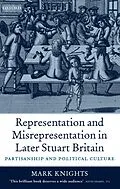In this original and illuminating study, Mark Knights reveals how the political culture of the eighteenth century grew out of earlier trends and innovations. Arguing that the period 1675-1720 needs to be seen as the second stage of a seventeenth-century revolution that ran on until c.1720, the book traces the development of the public as an arbiter of politics, the growth of a national political culture, the shift towards a representative society, a crisis of public discourse and credibility, and a political enlightenment rooted in local and national partisan conflict. The 'public' acquired a new status in the later Stuart period as a result of frequent elections, the lapse of pre-publication licensing, the emergence of party politics, the creation of a public debt and ideological conflict over popular sovereignty. These factors enlarged the role of the public and required it to make frequent acts of judgement. Yet contemporaries from across the political spectrum feared that the public might be misled by the misrepresentations peddled by their rivals. Each side, and those ostensibly of no side, discerned a culture of passion, slander, libel, lies, hypocrisy, dissimulation, conspiracy, private languages and fictions. 'Truth' appeared an ambiguous, political matter. But the reaction to partisanship was also creative, for it helped to construct an ideal form of political discourse. This was one based on reason rather than passion, on politeness rather than incivility, on moderation rather than partisan zeal, on critical reading rather than credulity; and the realisation of those ideals rested on infrequent rather than frequent elections. Finding synergies between social, political, religious, scientific, literary, cultural and intellectual history, 'Representation and Misrepresentation' reinvigorates the debate about the emergence of 'the public sphere' in the later Stuart period.
Autorentext
Mark Knights is Senior Lecturer in British History at the University of East Anglia, Norwich
Zusammenfassung
In this original and illuminating new study, Mark Knights reveals how the political culture of the eighteenth century grew out of earlier trends and innovations. Arguing that the period from 1675 needs to be seen as the second stage of a seventeenth-century revolution that ran on until c.1720, Representation and Misrepresentation in Later Stuart Britain charts the growth of a national political culture and traces the development of the public as anarbiter of politics. In doing so, it uncovers a crisis of public discourse and credibility, and finds a political enlightenment rooted in local and national partisan conflict. The later Stuart period was characterized by frequent elections, the lapse of pre-publication licensing, the emergence of party politics, the creation of a public debt, and ideological conflict over popular sovereignty. These factors combined to enhance the status of the 'public', not least in requiring it to make numerous acts of judgement. Contemporaries from across the political spectrum feared that the public might be misled by the misrepresentations pedalled by their rivals. Each side, andthose ostensibly of no side, discerned a culture of passion, slander, libel, lies, hypocrisy, dissimulation, conspiracy, private languages, and fictions. 'Truth' appeared an ambiguous, political matter. Yet the reaction to partisanship was also creative, for it helped to construct an ideal form ofpolitical discourse. This was one based on reason rather than passion, on moderation rather than partisan zeal, on critical reading rather than credulity; and an increasing realization that these virtues arose from infrequent rather than frequent elections. Finding synergies between social, political, religious, scientific, literary, cultural, and intellectual history, Representation and Misrepresentation in Later Stuart Britain reinvigorates the debate about the emergence of 'the public sphere' in the later Stuart period.
Inhalt
- Representation and the Public
- 1.: Introduction
- 2.: Public Politics
- 3.: Petitions and Addresses
- 4.: Informing Public Judgement at the Polls
- Public Discourse and Truth
- 5.: The Evolution of Print Culture and the Libels of Public Discourse
- 6.: Truth and Fiction in Age of Party
- 7.: Consequences
- Bibliography
